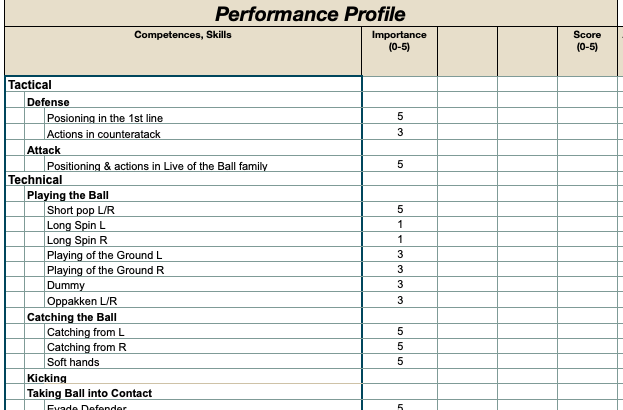FUNdamental Stage – focus on FUN so why performance profiling?
We are ending the season with RC Invictus Mini’s (Under 12 age group) and want to give some feedback to the players. “Next week is the last training of the season, we are also going to give out individual reports. These count for school to btw.”. “How do you know which schools we are?”.
Disclaimer: this is not about a Super Rugby Approach for Kids!
FUNdamentals
First, the development phase of these kids. We need to built the foundation for the future development of the individual players and keep the work Fun too, find challenging games that are not just keeping the players busy but create that learning opportunity.
Goals
Desmond Tuiiavi and I decided to make the next aspects important for the last bit of the season and the return after the corona stay-at-home:
- Develop fundamental movement (prepare for SAQ work later)
- Develop the decision making of the Ball Carrier: recognise and attack space, offload in contact)
- Develop the decision making of the player in support of the Ball Carrier: receive offload and continue or support him in keeping possession of the ball
- Line-up in Defense: make the wall
- Tackle low and inside / out
I think these goals fit well with the FUNdamentals phase. Of course the seven week program was set-up with Supercoach Online. (eat your own dogfood Martin!).
Evaluate
How did the players react to the program?
- Well, first FUN and games, we had a lot of fun and the players worked hard. We do lots of water stops between exercises, this is also where the players learn that when they work hard, there is also time to rest – switching on/off mentally as well.
- Very difficult to work on fundamental movement, we introduced movement patterns in a fun way but the players are really sloppy in execution. We noticed poor / lacking strength to maintain balance standing on one leg or perform a correct landing after long jump.
- We used a “tag-must-pass” game to develop off loading and running lines of players in support. When playing contact rugby we found that players move to “breakdown mode”: making contact, turning in to present the ball, going to ground. Clearly we need to work on the “off-load first” mindset.
- Make the Wall exercises were easy – an opportunity for Des and me to discuss where and how to join that first line of defence. Also included getting on your feet quickly to the exercises. But getting in the defensive shape during both the rugby game and the “tag-must-pass” game was a different thing! Players were still very individualistic in game time.
- Tackle low and in/out. We focussed on feet before tackle, used tackle donuts made the tackle easy by starting attackers 4-5m from defender. I like to think we improved, biggest win was the mindset of all players that by allowing to be tackled you help each other. Training is not the place to demonstrate “superior” skills!
Video analysis
Des and I used video to look at our own presentation of exercises and how the players reacted to it. Very interesting as always and a lot of pointers.For example: one training Des noticed I really talked far too much, so really focussed on asking open questions the next session.
Would have liked to use Coach’s Eye but had technical problems with tablet (need more memory) so this has to wait. I used my Sony HDR camera and simple iMovie on my Mac. Need quicker Mac to convert the video though….
Performance Profiling
I got this great Excel Spreadsheet that practically covers all areas of rugby development, so I made a tab for the Under 12 target audience, reflecting on the topics we included in the seven week phase of course. Lots of things to look at, but let us focus on the skills we tried to improve.
We scored the individual players and it was great to do this with Dessie, who has a great eye to detail.
With one week left to go we have some time to detail the missing “gaps” and look-out for various areas for the some players.
Of course all the players had a very positive and encouraging profile and score. We gave advise for max 3-4 areas. We did not calculate an overall score and did not compare the players individual score either.
Conclusion
It took me an hour to decide on the performance profile and align with Des. Another two hours to detail the form for the ten players we had the last period.
We did not score before, but we think the program benefited the players in their development.
Setting up the profile helped Desmond and me to focus our attention too!
Related Documents
- Find the performance profile we set-up here for reference
- Download an example training schedule from SuperCoach Online
- More information on Performance Profiling in this article
- More information on SuperCoach Online
Subscribe and get notified when I add new posts to the Blog;

1 comment for “Performance Profiling for Under12?”